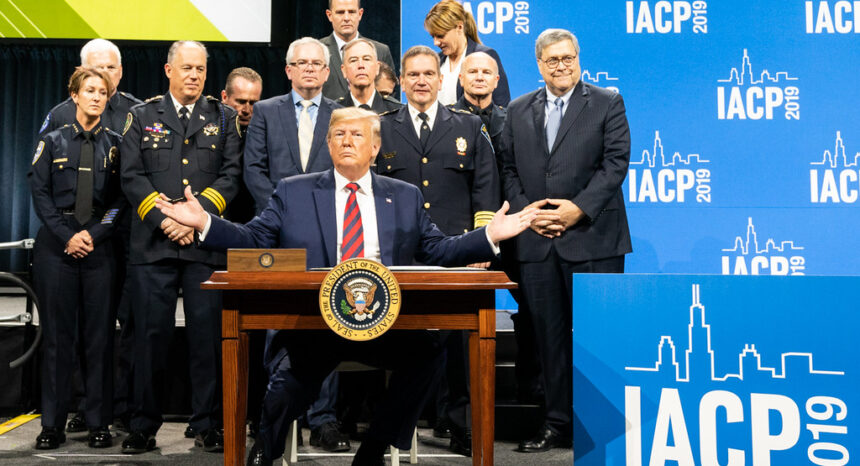A new study reveals that voicing support for police can be a “dog whistle” politicians use to appeal to voters threatened by challenges to America’s racial status quo. Donald Trump’s expressions of support for police, researchers find, served as coded language that mobilized voters who were anxious about the social and economic status of white Americans in the lead-up to the 2016 presidential election.
The paper, which appears in this month’s edition of the journal Criminology, shows how U.S. voting patterns in 2016 were linked to feelings about race and law enforcement — a dynamic that could play out again in this year’s presidential election, says lead researcher Kevin Drakulich, an associate professor of criminology and criminal justice at Northeastern University.
Drakulich and his colleagues discovered that Democrats who supported the Black Lives Matter civil rights movement were more likely to show up at the polls in 2016 and vote for the Democratic presidential candidate, Hillary Clinton. The authors write that the racial justice themes of Clinton’s campaign and her support for the Black Lives Matter movement “seem to have encouraged some Democratic voters with greater racial resentments to stay home on election day — whereas anti-racist Democrats voted at a very high rate.”
Meanwhile, Republicans who supported the police and expressed higher levels of racial resentment were more likely to choose Trump for president four years ago. Trump’s candidacy appears to have suppressed turnout among Republicans with lower levels of racial resentment, the study finds.
Drakulich says it’s tough to make predictions about the 2020 election because it’s unclear whether and how the coronavirus pandemic will impact turnout and voters’ choices. But, he explains, Americans could again be swayed by their feelings about police and toward protestors, whose demonstrations sometimes turn violent, recent news coverage shows.
All week this week, Black Lives Matter advocates have held rallies nationwide to protest the death of George Floyd, a 46-year-old black man, while in police custody in Minneapolis. Floyd was arrested Monday after a convenience store employee accused him of using a counterfeit $20 bill to buy cigarettes. During the arrest, a police officer pressed his knee into Floyd’s neck for nearly nine minutes, and Floyd was “non-responsive” for part of that time, CNN reported.
“As long as there is still a bit of movement or some momentum toward achieving racial justice,” Drakulich says, “[and] as long as you have that energy and push on one side, there is going to be a response, which has sometimes been described as a backlash.”
Drakulich and his co-authors find that the political signaling Trump used when he expressed support for police during his 2016 campaign mirrors the type of racial dog whistling conservative candidates used during the civil rights movement in the 20th century. A dog whistle, they explain, is “a seemingly neutral statement that has special meaning to a subset of voters with a specific set of shared views.”
Trump’s tweet of “LAW & ORDER!” on Sunday also seems to be a callback to the 1960s, when conservative politicians often framed protests as a law-and-order issue rather than a civil rights issue, Drakulich notes. “There is a long history in this country, going back to the origins of the civil rights movement, of using law-and-order rhetoric as a dog whistle,” he says.
To better understand how voters’ feelings about race and law enforcement affect ballot choices, Drakulich and his colleagues analyzed data collected through the 2016 American National Election Studies Time Series Survey. The survey asks a nationally representative sample of U.S. citizens about their voting behavior as well as about the police, race, racism and the Black Lives Matter movement.
Researchers tried to detect and measure racial resentment by including questions that asked, for example, whether inequalities would be solved if black people tried harder and whether black people received less than they deserved. They also asked participants whether they believed black people have too little, just about the right amount or too much influence in U.S. politics.
Drakulich and his colleagues focused on the responses given during interviews conducted in the two months following the 2016 general election. A total of 1,059 adults participated in face-to-face interviews and another 2,590 completed online questionnaires.
Among their other key findings:
- “Warmth toward the police was associated with an increased likelihood of voting among Independents and especially among Republicans,” they write. “Feelings toward the BLM [Black Lives Matter] social movement had opposite effects for Democrats and Republicans, with affection driving Democratic turnout and animus driving Republican turnout. Racial resentment similarly depended on party, suppressing turnout for Democrats while increasing it among Republicans.”
- Researchers estimate that survey participants who rated their feelings toward Black Lives Matter protestors as “cold” – they rated protestors low on a “thermometer scale” that ranged from cold to warm – had a 78% chance of voting for Trump. On the other hand, the odds that a participant who felt “warm” toward the Black Lives Matter movement voted for Trump was about 12%.
- “Racial resentment and perceived Black political threat were also strongly related to vote choice,” the researchers note. “Those with high racial resentment and those who believed that Blacks have too much influence over politics both had very high predicted probabilities of voting for Trump.”


Expert Commentary